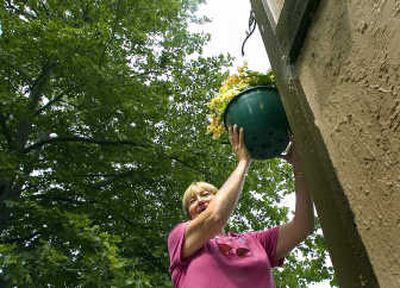Woman fights kidney disease

Kacey Burke is an energetic 45-year-old determined to live life to the fullest.
Her positive outlook is contrary to what you’d expect of someone who, at age 21, was diagnosed with an inherent life-threatening condition known as polycystic kidney disease and will undergo an organ transplant soon.
“I’m the luckiest person in the world,” Burke said. “Sure, the disease is bad luck, but since I have it and have reached the transplant stage, the outpouring of support and how many people were willing to give me a live organ donation just blew my mind. I feel like a rock star.”
Burke might feel like a rock star, but in real life, she’s a horticulturalist for the city of Spokane. Her domain is the beautiful surroundings of Riverfront Park.
“I love my job. I love the people,” she said with a beaming smile planted on her tan face.
When her condition worsened, Burke “kept it pretty confidential until I pulled myself together. Then word got out, and people came out of the woodwork,” she said.
“One friend called me and said, ‘You can have my kidney.’ He went through all the testing, and we weren’t a match. But because of the testing, he found out he had bone cancer. He was so happy it was discovered early so he could do something about it.”
Burke leaned forward and smiled, “Everything happens for a reason.”
Polycystic kidney disease is the most common life-threatening genetic disease in the United States. According to the PKD Foundation (www.pkdcure.org), more than 600,000 people in the United States – and 12.5 million worldwide – battle this disease, outranking well-known diseases such as Down syndrome, cystic fibrosis, muscular dystrophy, hemophilia and sickle cell anemia combined.
Yet, polycystic kidney disease remains in obscurity.
“It’s not disfiguring, and it affects typically older people, so there’s no heart-rending like with kids who have Down (syndrome) or something on that order,” Burke said. “There’s a lot of information out there, but it just doesn’t get discussed very often.”
The disease attacks the kidneys with innumerable cysts that interfere with filtering waste. The kidneys become enlarged, which can lead to kidney failure.
“So many people end up in renal failure,” Burke said. “There’s no cure; there’s only treatment, which is dialysis or transplants. That’s why organ donors are so needed.”
Burke becomes highly charged when discussing organ donations – and for good reason. She will become the third in her family to receive an organ transplant.
“My brother received an organ transplant in 2003 and my sister received one from a nonrelated live donor in 2004. And then there’s me,” Burke said. “The lucky gift for me comes from a first cousin in Iowa. I’m paying her expenses to come to Spokane for the transplant.”
Knowing firsthand the value of organ donations, Burke and her siblings also are organ donors.
“I was matched to be a bone-marrow donor, but my oldest sister, who also is a bone-marrow donor, lived closer to the hospital, so she became a donor to an unknown recipient in 1986.”
Several years ago, Burke ran a local PKD Foundation chapter. “We didn’t drum up a lot of support. We focused more on the emotional side because most people aren’t diagnosed until later in life, and then there’s the desire to cover it up,” she said.
Currently, 76,118 people nationwide are waiting for kidney transplants, with 1,138 of those in Washington (www.unos.org)
“In Spokane, 206 people are waiting for kidney transplants. Spokane averages 50 transplants a year,” Burke said.
“The average transplant lasts 10 to 15 years,” she added. If Burke stays within that statistical range, she’ll need another kidney transplant in about 15 years. “I might need another one in six months, but I hope not,” she said. She also will have to take medication for life.
“I’m thrilled to be getting a kidney transplant. I feel loved and blessed that my life is going in that direction. For some reason, I’m totally calm,” Burke said.
“My transplanting team is great. They say I’m a ‘slam dunk.’ That’s the best news I could get.”
The surgery will be covered by Burke’s private insurance and Medicare. “Thank God for that,” she said. “And thank God I’m healthy enough going into it that they’re not looking for any serious complications.”
Burke will be off work for three months. After that, she has goals to be achieved. One is to be an advocate for the developmentally disabled.
“They truly love their jobs and are great people to work with. I’d love to do something in my work where they can be employed under my supervision,” she said.
Burke is mindful that the gift she’s receiving will help her to fulfill her goals.
“Organ donation is the main thing. When people are educated, they’ll understand how important this is.
“Remember,” Burke said with a smile, “everything happens for a reason.”